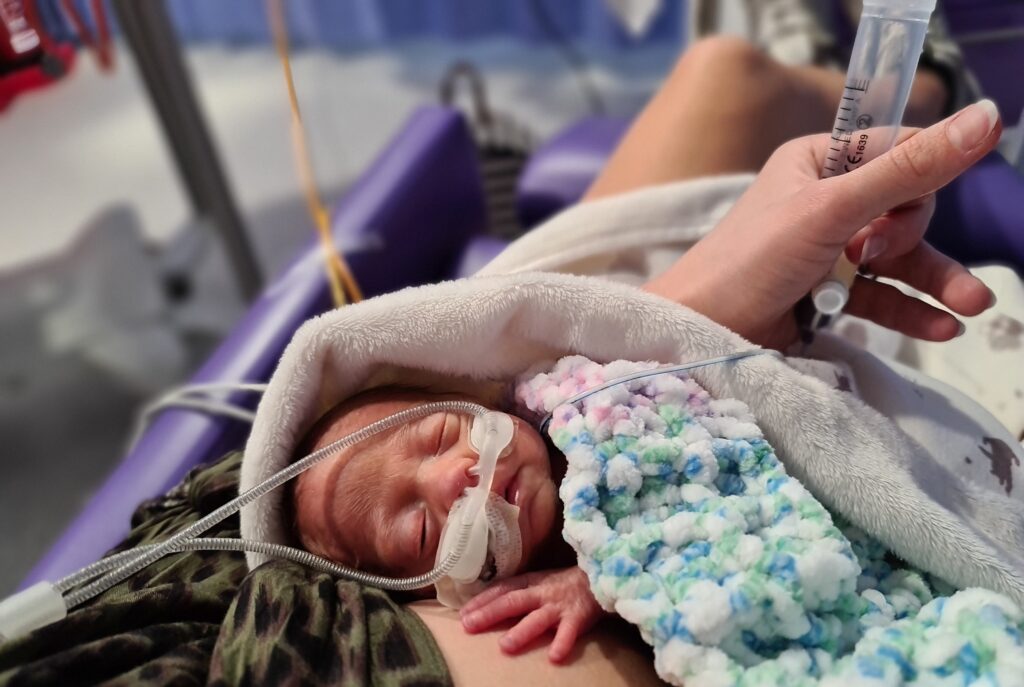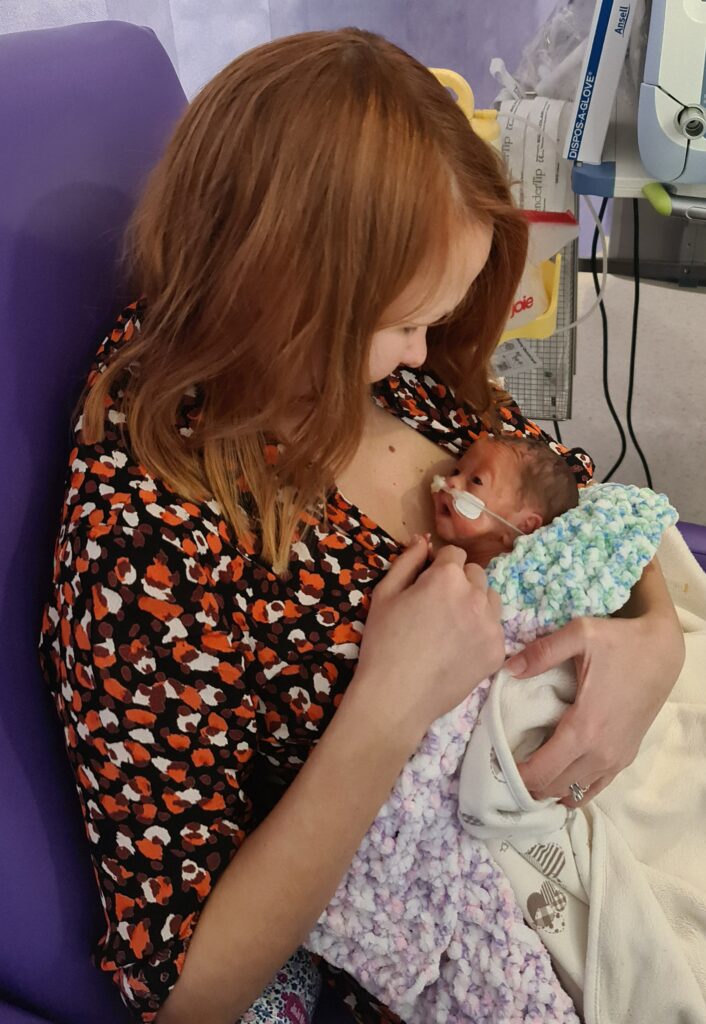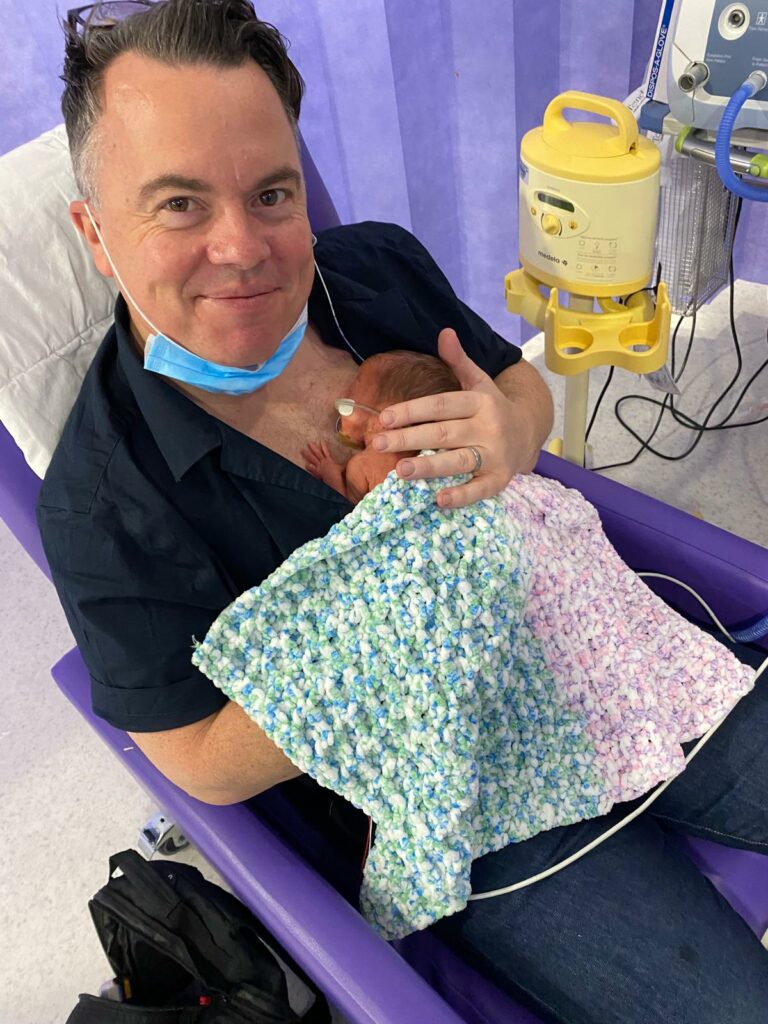
Sian and Pete’s introduction to parenthood was very different to the one they’d pictured. Like most expectant parents, they’d imagined quiet days at home getting to know their new baby, interspersed with joyful visits from excited friends and family. What they experienced instead was days and weeks on a neonatal intensive care unit, watching a medical team care for a baby that had arrived three months before her due date.
Baby Nansi was whisked off to the neonatal intensive care unit (NICU) within minutes of her birth, so Sian was only able to hold her very briefly before she was intubated and taken away in a transport incubator. What followed was an anxious four hour wait until finally they were able to see her.
Both Sian and Pete describe their introduction to NICU as an “assault on the senses”. They were led to an incubator where their new daughter lay, ventilated, attached to countless pumps and under a blue light to prevent jaundice. Though they were desperate to hold her, all they could do for now was reach into the incubator and touch her. At this time her face was largely covered by an eye mask as her eyes were not able to be exposed to the jaundice light.
Sian says: “Pete and I took it in turns to sit next to her little box for days. As it was Covid we were never able to be at her bedside at the same time which brought its additional challenges. While I loved her fiercely, and was willing her with all my heart to pull through, for a while I didn’t feel like I was properly her mum. Her medical needs meant that I wasn’t able to practically do much for her in those first few days other than pump, which left me feeling desperate and deflated. It felt unnatural that someone else was in charge of my baby, even though they were doing everything in their power to help her.”
Pete agrees: “The nursing team were brilliant at getting us as involved as much as possible with doing her cares and changing her nappies, but I was petrified of hurting her or pulling out a wire. Without being able to do the thing that should have been most natural, I just felt a bit helpless and detached.”
It wasn’t until the third day on NICU that Nansi was stable enough to come out of her incubator for a cwtsh with her mum, and a day after that for Pete. It’s an experience, they say, that changed everything. Sian says: “I can’t begin to explain how it felt to have Nansi’s skin against mine and be able to comfort and connect with her. Although I struggled with my milk supply, having that skin to skin contact really did make a difference. But it was about so much more than that too. For the first time, I felt like she was mine, that I was her mum and that she needed me. I used to tuck her inside my dress, sing to her, read to her and tell her about all of the family and friends that she would meet when we finally got to go home, and when Covid had passed.

Skin to skin contact, otherwise known as kangaroo care, is actively encouraged on the neonatal intensive care unit. For premature and low birth weight babies in particular, the physical contact helps regulate the baby’s body temperature, stabilise breathing, and promotes bonding between parent and child.

Sian said: “It was really important to me that Pete got as much skin to skin time with Nansi as I did. As parents, you’re a team and I wanted the two of them to have as intense a connection as there was between me and her. I could feel Nansi relax when we were skin to skin but I could also see the impact it made on the monitors. Both her saturation levels and her temperature would regulate.
As time went on, Pete and Sian were able to have Nansi out of the incubator more and more.
Nansi smiled for the first time while being held by her dad and though they went through a lot, Nansi’s mum and dad now look back at those hours spent cuddling Nansi with huge fondness.
Sian says: “Although we spent Nansi’s first 78 days on a hospital ward, holding her, talking to her, and feeling her little chest go up and down against mine created an intimate world with our baby that didn’t materially exist. A world away from the constant beeps and hums of machines. It’s not the start in life that we would ever have chosen for her but the guidance we were given from the NICU team really humanised the experience and helped us create memories that we’ll hold on to forever.”







